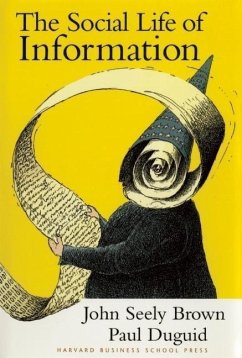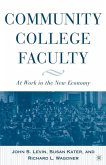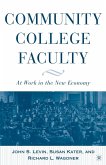To see the future we can build with information technology, we must look beyond mere information to the social context that creates and gives meaning to it. For years, pundits have predicted that information technology will obliterate the need for almost everythingfrom travel to supermarkets to business organizations to social life itself. Individual users, however, tend to be more sceptical. Beaten down by info-glut and exasperated by computer systems fraught with software crashes, viruses, and unintelligible error messages, they find it hard to get a fix on the true potential of the digital revolution. John Seely Brown and Paul Duguid help us to see through frenzied visions of the future to the real forces for change in society. They argue that the gap between digerati hype and end-user gloom is largely due to the 'tunnel vision' that information-driven technologies breed. We've become so focused on where we think we ought to bea place where technology empowers individuals and obliterates social organizationsthat we often fail to see where we're really going and what's helping us get there. We need, they argue, to look beyond our obsession with information and individuals to include the critical social networks of which these are always a part. Drawing from rich learning experiences at Xerox PARC, from examples such as IBM, Chiat/Day Advertising, and California's 'Virtual University', and from historical, social, and cultural research, the authors sharply challenge the futurists' sweeping predictions.They explain how many of the tools, jobs, and organizations seemingly targeted for future extinction in fact provide useful social resources that people will fight to keep. Rather than aiming technological bullets at these 'relics', we should instead look for ways that the new world of bits can learn from and complement them. Arguing elegantly for the important role that human sociability plays, evenperhaps especiallyin the world of bits, The Social Life of Information gives us an optimistic look beyond the simplicities of information and individuals. It shows how a better understanding of the contribution that communities, organizations, and institutions make to learning, working and innovating can lead to the richest possible use of technology in our work and everyday lives.
Praise for The Social Life of Information:
"A thoughtful and challenging read that belongs on the bookshelf of anyone trying to invent or make sense of the new world of information." - Amazon
"Essential Reading for Modern Managers" - Businessweek
"An intellectual gem" - Publisher's Weekly
"This deserves to be one of the best-read books of the internet age." - The Financial Times
"The Social Life of Information will help technologists keep an eye on the bigger picture and avoid the tunnel vision that can lead promising companies down blind alleys." - Eric Schmidt
"A thoughtful and challenging read that belongs on the bookshelf of anyone trying to invent or make sense of the new world of information." - Amazon
"Essential Reading for Modern Managers" - Businessweek
"An intellectual gem" - Publisher's Weekly
"This deserves to be one of the best-read books of the internet age." - The Financial Times
"The Social Life of Information will help technologists keep an eye on the bigger picture and avoid the tunnel vision that can lead promising companies down blind alleys." - Eric Schmidt








